Tag: News
Congress Updates
by The Cowl Editor on October 31, 2019
Congress Updates
by Thomas Beaton ‘22
Student Congress Publicity
Fr. Brian Shanley, O.P. discussed various topics including the school’s position as compared to other competing schools. It was mentioned that the endowment of the school was lower than other schools. In order to grow the endowment, the school asks for donations and raises tuition, however with the raising of tuition more financial aid will be needed.
Fr. Shanley also discussed that the school’s goal to grow diversity and inclusivity will continue to be goal of the school through the admissions process.
Student Congress also introduced a new bill regarding the dissolution of certain clubs and organizations on campus due to inactivity. The bill will be voted on at the next meeting.
Student Congress meets every Tuesday at 5:30 p.m. in Ruane LL05 and is open to everyone.
It’s Called Fashion, Look It Up: BOP Fine Arts Hosts PC Alumni in the Fashion Industry
by The Cowl Editor on October 31, 2019
Campus
by Sienna Strickland ’22
News Staff
Providence College’s Board of Programmers (BOP) is always busy planning fun events for students around campus. Anne Barbera ‘21, member of the Fine Arts committee, talks about the contributions Fine Arts makes to campus life.
The Arts Committee has had a busy year so far with a myriad of diverse programming, but, until last Thursday, had yet not ventured into the field of fashion. “Style Sophisticated,” an event held in ‘64 Hall on Oct. 24, changed this.
Barbera, one of the main planners behind the event, discussed the event’s origin story, stating, “I have always been interested in fashion, and felt that it was an area PC needed to touch upon more. I was deeply fascinated by the fact that we have successful women PC alum who work in the industry. I felt that more people should know about these talented women and the paths they had to take—as well as receive some fashion advice in the process!”
Like previous Fine Arts events, the turnout was impressive. Students, like Barbera, recognized the unique opportunity to hear from these women working in fashion. “The turnout was great, Kelly Schneider and Sarah Viens [the speakers] were very informative, and overall everything went wonderfully. It was an honor to have them.”
“The Fine Arts committee is one of the ten committees on the Board of Programmers,” Barbera says. “We plan all of the events that have to do with the arts.”
Continuing by listing some events the committee has hosted this past year, Barbera states, “We held a trip to the Boston Arts Festival, put together a tie-dye making event on Slavin lawn called ‘Clear Skies and Tie Dyes,’ and also had a vision board- making event in McPhail’s.” These events have all been massive successes in terms of turnout, often running out of materials within an hour of their start time.
Fine Arts has done a lot of work this year, but they are nowhere near done. “We would like to continue to reach audiences on campus that we have never thought to reach before with our events. This year so far, we have been doing a great job on diversifying our projects, but we are by no means complacent. We are hoping to wow the crowd with the events we have on the horizon for the rest of the semester.”
Barbera gave a quick preview of some of these future events. The Fine Arts committee has two events planned for the upcoming month of November. On Nov. 5 they will be hosting a trip to Providence Performing Arts Center at 7 p.m. to watch the Aladdin musical. They will also be hosting a muse painting event called “Drink and Dabble” on Thursday, Nov. 21 at 7:30 p.m.
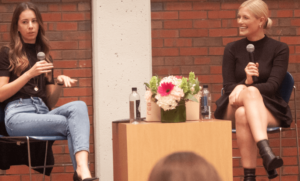
Brianna Colletti ’21/THECOWL
Women Making Big Strides in Science: Dr. Amanda Lynch and Ava Calle ’12 Speak at Women in STEM Event
by The Cowl Editor on October 31, 2019
Campus
by Alexandra Huzyk ’20
News Staff
On Wednesday, October 23, Women in STEM hosted their third event, inviting speakers Dr. Amanda Lynch and Ava Calle ’12 to talk about the challenges and opportunities that they have faced pursuing careers within the STEM field.
Lynch, a climate scientist currently teaching at Brown University, obtained a Ph.D. in atmospheric science from the University of Melbourne in 1993. She began as an undergraduate pursuing degrees in electrical engineering and physics, but quickly switched to applied mathematics due to her negative experiences in the realm of laboratory science.
“In engineering and chemistry labs, I didn’t feel welcome, and I was called on to repeatedly demonstrate my competence,” Lynch said. She shared that “having your competence and belonging questioned over and over again, you start to internalize that,” and it is important to remember that “you do belong and you are competent.”
In her presentation, Lynch described data from a 2015 study in which 100% of 60 women scientists had reported encountering one or more patterns of gender bias in the workplace. These experiences were even more pronounced for women of color, who were often questioned whether or not they were supposed to be in labs after hours.
In terms of computational science, Lynch explained, “Women have really been at the forefront of coding, and in fact made up the majority of computer operators, until the ’80s when these numbers plummeted.”
During the 1980s, Lynch explained that people started to think that it was necessary to have knowledge of computers or a love of gaming in high school in order to pursue it in college. “This shift in culture really influenced the uptick of women in science; especially in an area like climate science, which is heavily computational,” said Lynch.
Throughout this change in culture, Lynch continued to code and became the first woman “Scientist 1” at a research center while working towards her Ph.D. However, with this achievement she also became the object of scrutiny. Male supervisors would constantly send female secretaries to check up on her, she received minimal support and guidance, and she was not considered for required computational resources to complete her work. Due to these gender biases, Lynch decided to change Ph.D. programs to another university.
As a climate scientist, Lynch said she started to become involved in field science while she was completing her Ph.D. and then more heavily as a post-doc. “I was very choosy about situations I chose to put myself in,” said Lynch. “I only took positions in which I was the lead researcher… and only with researchers I knew and trusted.” This is due to the issue of sexual harassment and assault in field experiences.
Although Lynch said that she has never personally experienced any form of sexual harassment in this domain of field science, she provided data which reports that harassment affects women more than men in these particular scenarios.
In order to navigate these situations, while pursuing a career in the STEM field, Lynch encouraged the audience to network with both female and male allies. Additionally, she said, “Support other women, refer them, cite them, nominate them. You can do your part, in very concrete ways, whenever you have the opportunity.” Lastly, Lynch stressed the importance of being stubborn and re-submitting proposals and work, especially in the field of academia.
Ava Calle, a Program Specialist and Board Certified Behavior Analyst (BCBA) in the Intensive Instruction Program at The New England Center for Children, presented after Lynch. Calle graduated from Providence College with a BA in psychology and a pre-health minor, and went on to obtain an MS in applied behavior analysis from Western New England University.
She began her presentation by considering the familiar question, “What do you want to be when you grow up?” She pointed out that this question becomes more weighted when you get older and, especially, as you go on to college. Calle said, “It seems like the question might be insinuating how successful you want to be.”
Calle shared that she knew she liked the sciences and people, and would typically answer the question by saying she wanted to go into psychiatric nursing or neuroscience—without actually being convinced of these statements herself.
During her time at PC, Calle conducted research in a cognition lab and completed an internship at the Groden Center. These experiences exposed her to research and design, as well as applied behavioral analysis. Particularly at the Groden Center, Calle was exposed to children with autism, severely challenging behavior, and students who communicated non-verbally.
In her current position at the NECC, for autism education and research, Calle has continued to ask questions as a researcher while also providing direct care as a teacher. She shared that she is still trying to figure out what she wants to be when she grows up, and where her career path will take her. She urged the audience to “think about who you want to be, not just what you want to be when you grow up.”
As for Calle’s suggestions for PC undergraduates, Calle recommended finding a mentor. “There are very strong females in my field. They are researchers and they are mothers and they are wives, and someone has probably been in your position before you.” She also suggested asking for feedback on your performances and always continuingto ask questions.
After both speakers presented, the audience was encouraged to ask questions. One student asked, “For the people in this room who don’t necessarily know what they want to do yet, what would you give them for advice?” Lynch suggested test driving careers, particularly in summer internships or working in a lab with a professor.
Calle said, “Utilize the network and the people in your department, but also other faculty at Providence College and get in touch with alumni. Don’t assume that if their title is X at that point, that they didn’t go through similar situations and jobs.”
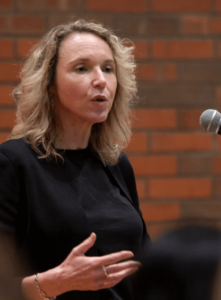
throughout her career.
Nicholas Crenshaw ’20/theCowl
Working for Greater Equality On-Campus: College Responds to Call for Greater Inclusion and Diversity
by The Cowl Editor on October 31, 2019
Campus
by Maura Campbell ’22
News Staff
On Monday, October 21, the Providence College student body received an email from Rev. Brian Shanley, O.P., president of the College, informing students, staff, and faculty of an update by the Office of Institutional Diversity, Equity, and Inclusion (IDEI). The email provided general information regarding IDEI’s recent work to promote diversity on campus, and specifically addressed some potential issues previously raised about the elementary and special education department.
In light of recent claims that the Department of Elementary and Special Education has not been an inclusive department and major on campus, IDEI has partnered with the department to help to create a more inclusive environment.
In reference to the ESE department, the email also mentioned Jennifer Swanberg, dean of the school of professional studies, high lightingher work “to develop a cultural transformation process with the goal of ensuring that all ESE faculty and staff are equipped with the evidence-based skills, knowledge, and competencies to foster this type of inclusive environment.”
In particular, the email included a flyer that was distributed at IDEI’s recent meeting, explaining their major initiatives. These initiatives include the Diversity Strategic Directions Steering Committee, a committee to help engage internal leaders in a conversation about diversity and create a clear plan and direction for diversity, and Advocates for Beloved Community (ABC), a team promoting racial justice and reconciliation on campus and addressing Title VI racial bias incidents.
The flyer also detailed IDEI’s five focus areas for 2019-2020. This strategic plan, known as PC200, hopes to promote diversity, equity, and inclusion at PC through these focus areas, “ranging from structural diversity, access, and equity, to student learning and development—and has developed relationships with a diverse team of campus partners to address these areas through educational training, specific programming, departmental counseling, and other initiatives,” Shanley said.
These five focus areas are structural diversity, access, and equity, institutional infrastructure, climate and intergroup relations, formal and informal curricula, and student learning and development.
In addition, the flyer included information about events and programming held at the Center at Moore Hall. This programming includes the Urban Dance Series, classes on diverse dance styles and culture held by Providence-based dancers and educators. Other programming includes Conversations for Change, a set of workshops inspired by Rev. Dr. Martin Luther King Jr., promoting “nonviolence, consensus building, and civic action,” and the World Cinema Series, a PC faculty-hosted program centered around “the film traditions and innovation of different countries throughout the world.”
This email highlights the work of the Office of Institutional Diversity, Equity, and Inclusion in recent and upcoming months. This work to promote diversity and inclusion is “critical to the future success of Providence College,” Shanley said. He further added that “each of us is responsible for communicating and working together to translate this vision into action.”
IDEI’s dedication to promoting diversity and inclusivity at PC an important part of the College’s mission, and this update is relevant to students seeking resources and outlets on these issues. The goal of their work can be summed up in their mission statement: “Rooted in our Catholic and Dominican identity, the Office of Institutional Diversity, Equity, and Inclusion advances Providence College’s commitment to developing purposeful collaborations across all areas of the College and the greater community to foster an environment where people of all backgrounds, cultures, identities and perspectives can flourish.”
The Office of Institutional Diversity, Equity, and Inclusion can be reached at diversity@providence.edu or in their office in Harkins 312.
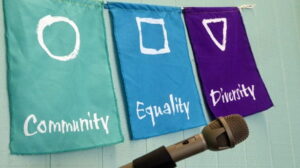
photo courtesy of publicdomainpictures.net
Bursting the PC Bubble: California Wildfires Continue to Run Rampant
by The Cowl Editor on October 31, 2019
National and Global News
by Kyle Burgess ’21
News Staff
Thousands of California residents have found themselves on the move as sweeping wildfires continue to engulf both ends of the state. This recent string of wildfires comes after a relatively quiet year in which no major wildfires occurred from May through mid-September, the typical California wildfire-causing dry season.
The tinder box conditions that breed such fires are the result of extremely dry summers that turn trees and leaves into fuel as well as strong winds which spread the fires across entire forests at a rapid pace. This process has been exacerbated by historically-strong winds throughout California as well as human involvement, with fallen power lines possibly to blame for two of the most recent fires.
Pacific Gas and Electric Co. (PG&E) admitted that power lines may have started two wildfires over the weekend in the San Francisco Bay Area, causing widespread electrical blackouts to prevent their spread by further fallen power lines in the face of high winds.
PG&E also reported to state regulators that these fires “match blazes that destroyed a tennis club and forced evacuations in Lafayette, about 20 miles east of San Francisco.”
Per CNBC, “at least 900,000 power customers…were in the dark at the height of the latest planned blackout, nearly all of them in PG&E’s territory in northern and central California.” Less than half of these customers had their services restored by this past Monday, with some 1.5 million people in 29 counties expected to experience their own blackouts in anticipation of strong winds.
At the same time, the Kincade Fire in Northern California continued to spread, covering a new total of 75,000 acres with firemen only able to contain 15 percent of the blaze. One spokesperson for Cal Fire, the California Department of Forestry and Fire Protection, claimed that it would take “weeks, if not months” to battle back the flames.
Some 180,000 people have been ordered to leave their homes in anticipation of Kincade’s flames, with the roads around Santa Rosa, CA packed bumper to bumper with cars trying to flee. High winds bringing gusts of more than 102 mph have fanned destruction across Sonoma, as 3,000 people continue to battle the blaze that has already destroyed nearly 400 structures, including the 150-year-old Soda Rock Winery.
The fires’ rapid pace and direction is difficult to predict, with some residents getting short or even limited notice of their paths. One BBC correspondent who quickly found himself in the way of The Tick Fire near Santa Clarita noted, that “My partner was in the house and had just seconds to get out, to pick up the dog, throw the dog in the car—gently—just get out. It happened that quickly and all our neighbors did exactly the same thing.”
Meanwhile, another fire threatens to engulf the famous Getty Center just outside of Los Angeles. The Getty Fire has so far covered 618 acres and destroyed eight structures, according to Los Angeles Mayor Eric Garcetti. The blaze, which was only 5 percent contained, also partially destroyed six other structures. An investigation into possible causes of the fire are currently underway. Arson has not been ruled out.
In addition to the Getty Center itself, many high-end homes in the Los Angeles area are at risk to the wide-sweeping flames, prompting further evacuations. Celebrities such as LeBron James were evacuated from their houses along with students of Mount Saint Mary’s University near UCLA.
As firefighters continue to slowly keep the blazes under control across the state, the destruction left in the fires’ wakes has prompted California Governor Gavin Newsom to declare a state-wide emergency as 43 of California’s 58 counties are under “red flag” warnings with ideal conditions for the flames to spread.
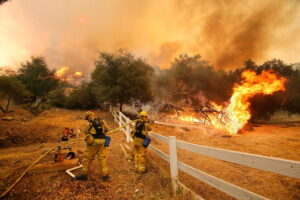
photo courtesy of flickr.com
PC Community Marches Against Transphobia and Homophobia
by The Cowl Editor on March 28, 2018
Campus
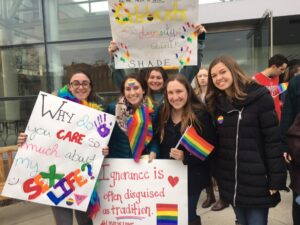
by Sabrina Guilbeault ’18
News Editor
At approximately 6:00 p.m. on Friday, March 23, close to 200 students gathered outside the front doors of the Slavin Center for a March Against Transphobia and Homophobia at Providence College.
The march was organized by SHEPARD, a student organization and support group for members of the LGBTQ+ community. SHEPARD’s overall mission is to build a safe, welcoming environment within the club and larger PC community. The executive board of the club invited panelists to speak at the end of the march in the Ruane Center for the Humanities, which included Kristine Goodwin, vice president of student affairs, Tiffany Gaffney ’03, assistant dean of students, and Dr. Christopher Arroyo, associate professor of philosophy.
The PC community was invited to the march via an informational email sent by Mallari Bosque ’18, SHEPARD president. “Please stand with Shepard in solidarity with love and respect,” the email stated. “The purpose of this march is to affirm LGBTQ+ members of the Providence College community and to recognize their experiences of homophobia and transphobia as valid.”
Many assumed that the march was a reaction to the recent bulletin board that was hung in St. Joseph Hall that said, “Marriage, the Way God Intended It,” promoting the Catholic Church’s doctrine on marriage as being between one man and one woman. For more on that story, please refer to the following link: https://www.thecowl.com/featured/bulletin-board-controversy.
Michael Smalanskas ’18, the resident assistant who put the bulletin board up on his floor, stated that he too thought the march was organized in reaction to that said board. “Many have considered my bulletin board homophobic and an act of hate speech,” he said, explaining that to support traditional marriage is in no way to be homophobic. “People are free to protest, but there should be a basic understanding from students and faculty at this college that Catholic beliefs are not hate speech.”
In an email to student leaders including members of the Board Multicultural Student Affairs, Student Congress, and Residence Life, Goodwin acknowledged the bulletin board controversy and said, “I believe we need to treat each other with respect at all times.” She went on to explain that she hopes the community would join her in being open to dialogue so that it can be informed and effective “allies and educators,” and said a way to do that was to walk in solidarity with SHEPARD “promoting unity, affirmation, and inclusion even amidst controversy.”
As participants gathered, students distributed rainbow stickers that said, “Hate is Not a PC Value.” Others held signs with messages such as “Love is Love,” “If God Hates Gays Why’d He Make Us So Cute,” “Jesus Had Two Dads and He Turned Out Fine,” and “Ignorance is Often Disguised as Tradition.”

“Do not engage in negative behavior,” said Bosque before the march commenced, also explaining that the marchers were not calling for action, but rather standing and marching out of solidarity and love. “Every person deserves equal amounts of respect,” she said. “We are not making demands, we just want to be heard, recognized, and loved.”
From Slavin, the marchers moved towards Raymond Dining Hall by passing McVinney and Moore Hall. From there, they marched around the Smith Quad after passing the Ryan Center, and went though Glay parking lot and up the Guzman stairs before entering into Ruane. All the while, marchers chanted, “Say it loud, say it clear, queer people are welcomed here,” and “Hey, hey, ho, ho, homophobia has got to go.”

At the conclusion of the march, many students filed into into Ruane 105 where each speaker was given a chance to share and reflect.
After Bosque spoke, Goodwin took the podium and emphasized that she welcomes feedback, especially when it is feedback given for the sake of helping others. She also talked about the social work her mother did with transgender individuals and explained that the church she wants to be part of is the kind of church that includes everyone.
Dr. Arroyo acknowledged the SHEPARD executive board for the work they did in organizing the march, and also stated he wished to not misconstrue what was happening at the march. “This is not dismissing Catholic teaching as homophobic, or attempting to stop free speech, or trying to go against Catholic teaching,” he said, explaining that this should not be a two sided argument of Catholics versus the side of the LGBTQ+ community. “Disagreements should not lead us to despair of resolving them.”
After discussing the meaning behind PC’s mission of Veritas, or the truth, he insisted the truth must be used to guide the College in these difficult times. “The spirit of the march is to identify truths,” he said. “Some members in our community identify as LGBTQ+, and they’re students who are equal and full members deserving of respect and love.”
When Dean Gaffney spoke, she acknowledged that though it states very clearly in the College’s policies that it does not discriminate based off of race, gender, or sexuality, the fact of the matter is that not all members of the PC community necessarily live this experience. “Plus, we must be honest with ourselves, when we say we are here for the LGBTQ+ community, we don’t know who they all are, and that is a truth we must acknowledge,” she said.
She then explained that when people are silent, they leave room for assumption. “We are all here for our own personal intentions,” she said. “I am not here because of a bulletin board, I am here because I am unapologetically an ally.”
Dean Gaffney then explained that ally-ship is not to be taken lightly, as it is an “intentional commitment to be there for and with others.” “I am unapologetically Catholic, and it is because of my faith that I am an ally,” she said. “If you think that we’re here just because of a bulletin board, you aren’t paying attention.”
“Some members of the LGBTQ+ community identify as Catholic,” said Dr. Arroyo, who then stated that homophobia and transphobia have no place at a Catholic institution. “We must insist that affirming the equal dignity of all human beings in what we say and what we do affirms our mission of a Catholic college.”
Other speakers included Dr. Jonathan Dator, staff psychologist at the Personal Counseling Center, Cate Latz of the Office of Institutional Advancement, and Kendra Brewster a professor in the public and community service department.
